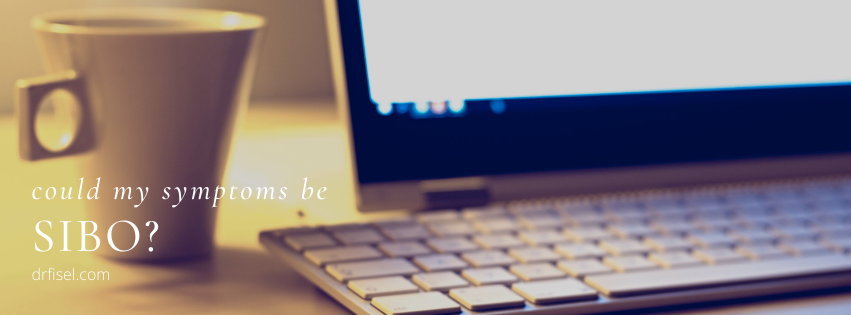
Could my symptoms be caused by small intestinal bacterial overgrowth (SIBO)?
It’s normal to grow bacteria in your large intestine, in fact it’s healthy to grow bacteria in your large intestine.
But what about when that good bacteria moves along into the small intestine and starts to grow?
The results are less than optimal and often uncomfortable.
When this happens, when bacteria from the large intestine moves into and grows in the small intestine, SIBO can create the following symptoms (Madormo):
- Bloating
- Flatulence
- Diarrhea
- Constipation
Frustratingly, these same symptoms might also indicative of other bowel disorders like, Irritable Bowel Syndrome (IBS), for instance. In fact, research shows that SIBO could be an underlying cause of IBS – and often times goes undiagnosed because of the similarities. (Ghoshal).
With persistent IBS, it might be time to take a look at the root cause – SIBO should be considered.
“SIBO sufferers are usually divided into one of three different categories: diarrhoea-dominant (D), constipation-dominant (C) or alternating variations of both.” (Lindemann)
Although there are several ways to determine if SIBO is at work in your gut, breath tests are the main form of diagnosis. Kits can be ordered through our office to measure hydrogen, methane, and hydrogen-sulfide gases – the gases produced in the small intestine that cause such discomfort.
If SIBO is present, treatment options are available. A general naturopathic approach might include the following:
- Anti-Microbial Combinations – including some form of: “Candibactin AR” and Candibactin BR” from Metagenics; Neem; “Biocidin and FC Cidal” from Biotics Research; and “Allimax Pro” by Allimax. (Please consult your naturopathic or medical physician before starting an anti-microbial regimen).
- Dietary Changes – Limiting foods that promote fermentation in the lower gut is advisable. Generally, a low FODMAP diet, monitored by a physician, is recommended.
- Intestinal Repair – Once symptoms improve, repairing the intestines so that motility normalizes, hopefully decreases the likelihood of recurrence in the future.
SIBO has a 40% chance of recurrence (Grace) complicated by fungal growth. Therefore, broad spectrum anti-microbial botanicals could provide benefits antibiotics do not. For this reason it always helpful to look at your symptoms from a whole health perspective.
Worried about whether or not you will ever feel relief from your intestinal discomfort? I would be happy to help you determine what underlying factors may be contributing to your symptoms.
If you live in the Guilford/ Branford/ New Haven/ Madison/ Clinton area and would like to learn more about SIBO and whether or not it’s affecting your overall health, Dr. Fisel is here to help. Call (203) 453-0122 or CLICK HERE to schedule a consultation.
REFERENCES
Bella Lindemann. “SIBO Series Part 1: Is Sibo the Hidden Cause of Your Ibs?” Bella Lindemann, Bella Lindemann, 30 Mar. 2021, https://bellalindemann.com/blog/sibo-series-part-1-hidden-cause-ibs.
Ghoshal, Uday C et al. “Small Intestinal Bacterial Overgrowth and Irritable Bowel Syndrome: A Bridge between Functional Organic Dichotomy.” Gut and liver vol. 11,2 (2017): 196-208. doi:10.5009/gnl16126
Grace E, Shaw C, Whelan K, Andreyev H. Review article: small intestinal bacterial overgrowth – prevalence, clinical features, current and developing diagnostic tests, and treatment. Alimentary Pharmacology & Therapeutics. 2013;38(7):674-688. doi:10.1111/apt.12456.
Madormo, Carrie. “SIBO: Symptoms, Treatment, Diet, and More.” Healthline, Healthline Media, 14 Sept. 2021, https://www.healthline.com/health/sibo.
Veloso, Hazel Galon. “FODMAP Diet: What You Need to Know.” Johns Hopkins Medicine, https://www.hopkinsmedicine.org/health/wellness-and-prevention/fodmap-diet-what-you-need-to-know.




